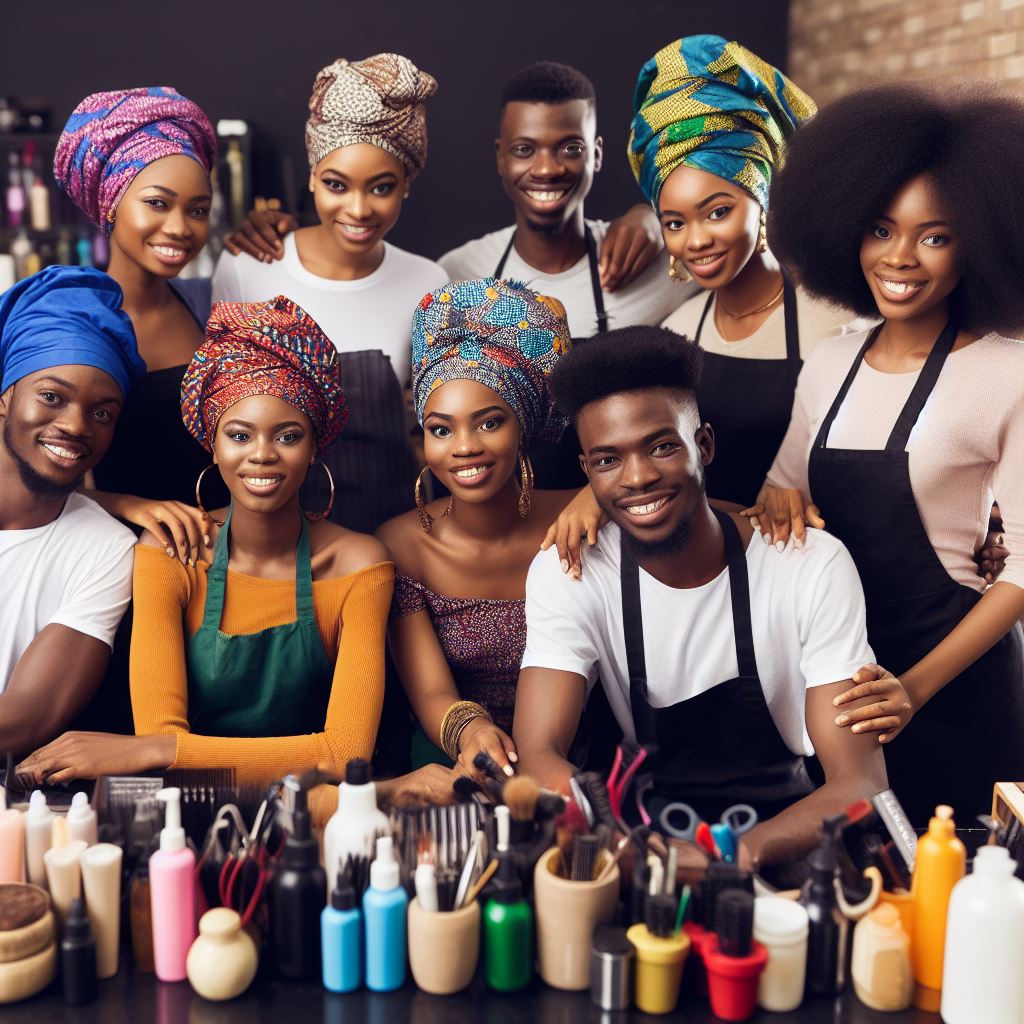Introduction
Brief overview of the hair industry in Nigeria
Understanding salaries and earnings is crucial for hair stylists in Nigeria.
The hair industry in Nigeria has experienced significant growth in recent years. Many individuals, especially women, value their hair and invest in various hair products and services.
The industry includes hair stylists, barbershops, hair salons, and beauty supply stores. Nigerian hair stylists are skilled in various techniques such as braiding, weaving, and styling.
Importance of understanding salaries and earnings for hair stylists
Understanding salaries and earnings is crucial for hair stylists in Nigeria. It helps them gauge their financial stability and plan for their future.
Knowing the average salary range for different hairstyling positions allows stylists to negotiate fair compensation with employers or set competitive prices for their services as independent stylists.
Additionally, understanding the earning potential in the industry can motivate stylists to invest in professional training and further enhance their skills.
In fact, the hair industry in Nigeria is a thriving sector that offers numerous opportunities for hair stylists.
It is vital for stylists to understand salaries and earnings to ensure fair compensation and financial stability.
Factors Influencing Salaries and Earnings
Location of the hair salon/stylist
- Salaries and earnings vary depending on the location of the hair salon or stylist.
- Stylists working in upscale areas or in metropolitan cities tend to earn higher salaries.
- In rural areas, where the demand for hair services may be lower, stylists may earn less.
Experience and skill level of the stylist
- Stylists with more experience and advanced skills are often able to command higher salaries.
- Those who have been in the industry for a long time and have built a strong reputation are highly sought after.
- Master stylists with exceptional talent and expertise can earn significantly more than others.
Reputation and client base
- The reputation of a hair stylist and their ability to attract and retain clients directly impact their earnings.
- A stylist with a large and loyal client base can charge higher prices and earn more income.
- Positive reviews, referrals, and word-of-mouth recommendations contribute to a stylist’s reputation.
Specialization or niche services
- Stylists who specialize in specific hair services or have niche expertise often earn higher salaries.
- Examples include stylists who specialize in bridal hairstyles, braiding, coloring, or extensions.
- Their specialized skills make them more in-demand and allow them to charge premium prices.
Education and certifications
- Stylists with advanced education and certifications tend to earn more than those without formal training.
- Continuous education and staying updated with the latest trends can also lead to higher earnings.
- Certifications from reputable academies or organizations enhance a stylist’s credibility and value.
Type of salon (high-end, mid-range, or budget-friendly)
- The type of salon a hair stylist works in greatly affects their earning potential.
- High-end salons typically charge higher prices, resulting in higher salaries for their stylists.
- Mid-range and budget-friendly salons may offer lower salaries but may have higher client volumes.
In short, several factors influence the salaries and earnings of hair stylists in Nigeria today.
The location of the salon, the stylist’s experience and skills, their reputation and client base, the specialization or niche services they offer, their education and certifications, and the type of salon they work in all play significant roles in determining their income.
By understanding these factors, both stylists and salon owners can make informed decisions to maximize their earnings and success in the industry.
Common Salary and Earning Ranges for Hair Stylists in Nigeria
Junior stylists/apprentices
- Salary range: Junior stylists in Nigeria typically earn between N30,000 to N50,000 per month.
- Earning potential through tips: Junior stylists have the opportunity to earn additional income through tips given by satisfied clients.
Intermediate stylists
- Salary range: As stylists gain experience, their salary range increases to around N70,000 to N90,000 per month.
- Increasing earning potential: Intermediate stylists can increase their earning potential by building a loyal customer base and offering additional services.
Senior stylists/salon owners
- Salary range: Senior stylists and salon owners earn significantly more, with salaries ranging from N100,000 to N250,000 per month.
- Income possibilities beyond regular salary: Senior stylists and salon owners have additional income opportunities through selling hair products, providing training, and owning multiple salons.
Generally, the salary and earning potential for hair stylists in Nigeria vary depending on their level of experience and position within the industry.
Junior stylists start with a modest salary but can supplement their earnings with tips.
Intermediate stylists earn a higher salary and can further increase their income by building a loyal customer base.
Senior stylists and salon owners enjoy the highest earning potential, with the opportunity to make additional income through various avenues.
Whether starting as a junior stylist or aiming to become a salon owner, the hair styling profession in Nigeria offers growth and financial opportunities for those willing to work hard and provide excellent services to their clients.
Read: Hair Stylist Tools: Must-Haves in Nigeria’s Salons
Additional Income Sources for Hair Stylists
A hair stylist’s income is not just limited to their regular salon job.
There are various opportunities for them to earn additional income and expand their professional horizons. Let’s explore some of these income streams:
Freelancing opportunities
Many hair stylists in Nigeria have started freelancing to supplement their earnings.
They offer their services independently for various events like weddings, fashion shows, and photoshoots.
This allows them to earn extra income while showcasing their skills outside of the salon.
Selling products and commissions
Another way for hair stylists to earn extra income is by selling hair care products to their clients.
They can recommend and retail products like shampoos, conditioners, oils, and styling gels, earning commissions on each sale.
This creates a win-win situation as both the stylist and the client benefit from the products.
Teaching workshops and seminars
Experienced hair stylists can share their knowledge and skills by conducting workshops and seminars.
They can teach aspiring stylists or even individuals who want to learn how to take care of their hair.
These educational sessions can be organized independently or in collaboration with salons or beauty schools.
Social media influencing and brand collaborations
The rise of social media has opened up new avenues for hair stylists to generate income.
Many stylists have become influencers on platforms like Instagram and YouTube, creating tutorials, sharing styling tips, and showcasing their work.
They can collaborate with hair care brands and earn money through brand endorsements, sponsored posts, and affiliate marketing.
By leveraging the power of social media, hair stylists can not only increase their earnings but also expand their reach and build a strong personal brand.
In general, hair stylists in Nigeria have several additional income sources that go beyond their regular salon jobs.
Freelancing, selling hair care products, teaching workshops, and social media influencing are just a few examples of how they can diversify their income streams.
By exploring these opportunities, hair stylists can not only increase their earnings but also enhance their professional growth and visibility in the industry.
Read: Nigeria’s Hair Stylist Unions and Associations

Delve into the Subject: Surviving Traffic: A Nigerian Bus Driver’s Daily Battle
Challenges and Considerations for Hair Stylists in Nigeria
Economic factors and purchasing power
- High inflation and rising cost of living affect the purchasing power of hair salon customers.
- Unstable exchange rates make it difficult to source quality hair products at affordable prices.
- The economic recession in Nigeria has resulted in reduced disposable income for many individuals.
- Income inequality in Nigeria creates disparities in the ability to afford hair styling services.
- Limited access to credit and financing options hinders the growth of hair salons.
Competition within the industry
- The hair styling industry in Nigeria is highly competitive, with numerous salons operating in every neighborhood.
- Established salons with a loyal customer base pose a challenge for new and smaller salons.
- Discounted pricing by competitors often leads to price wars and reduced profit margins.
- Finding a unique selling point and offering quality services becomes essential to stand out among competitors.
- Competition among stylists also arises from the growing trend of home-based stylists.
Fluctuations in demand for services
- Demand for hair styling services varies throughout the year, with peak periods during festive seasons.
- The rainy season affects the demand for certain hairstyles that are susceptible to frizz and humidity.
- Consumer preferences change rapidly, leading to shifts in demand for different hairstyles and treatments.
- Recession periods result in reduced willingness to spend on non-essential services like hair styling.
- Seasonal trends and fashion influences also impact the demand for specific hair styling services.
The impact of COVID-19
- The COVID-19 pandemic forced the closure of hair salons for an extended period, leading to immense financial losses.
- Restrictions and social distancing measures continue to limit the number of customers salons can serve.
- Hygiene and safety concerns have increased the cost of providing services due to the need for personal protective equipment.
- Customers’ fear and uncertainty have resulted in reduced demand for hair styling services.
- The pandemic has accelerated the shift towards online bookings and contactless payment methods.
In review, hair stylists in Nigeria face several challenges and considerations.
Economic factors and purchasing power directly impact their customer base, while competition within the industry poses threats to profitability.
Fluctuations in demand, both seasonally and due to changing trends, require adaptability and innovation.
The COVID-19 pandemic further exacerbates these challenges, demanding additional safety measures and impacting revenue.
However, with proper strategic planning, adaptation to changing market conditions, and a focus on customer satisfaction, hair stylists can overcome these challenges and thrive in the Nigerian market.
Read: Hair Styling in Nigeria: A Guide to the Profession
Tips for Finding Financial Success as a Hair Stylist in Nigeria
Achieving financial success as a hair stylist in Nigeria requires a combination of talent, hard work, and strategic planning.
Here are some tips that can help you reach your financial goals:
Continuous education and skill improvement
- Stay updated with the latest hair styling techniques and trends.
- Attend workshops, seminars, or training programs to enhance your skills.
- Invest in professional development to differentiate yourself from competitors.
- Offer a diverse range of services to attract a larger customer base.
- Continually seek feedback from clients and incorporate it into your work.
Building a strong client base and providing excellent customer service
- Focus on building long-term relationships with your clients.
- Offer personalized services and give attention to each client’s unique needs.
- Create a welcoming and comfortable salon environment to enhance the customer experience.
- Ask for referrals from satisfied clients and offer incentives for referring new customers.
- Respond promptly to client inquiries and concerns to build trust and loyalty.
Networking and collaborating within the industry
- Attend industry events, trade shows, and conferences to network with fellow professionals.
- Participate in local hair styling competitions to showcase your talent and establish your reputation.
- Collaborate with other stylists or salons for promotional events or joint advertising campaigns.
- Stay connected with industry influencers, bloggers, and social media influencers.
- Engage with online hair styling communities and contribute valuable insights.
Effective marketing and branding strategies
- Create a professional brand identity that reflects your unique style and values.
- Invest in a well-designed logo, website, and social media presence.
- Use online platforms to showcase your portfolio and attract potential clients.
- Offer special promotions or discounts to attract new customers and encourage repeat business.
- Collect customer testimonials and showcase them on your website and social media platforms.
Financial management and budgeting
- Maintain accurate records of your income and expenses to track your financial progress.
- Create a budget to allocate funds for business expenses, savings, and investments.
- Seek professional advice from an accountant or financial advisor to manage your finances.
- Consider diversifying your income by offering retail products or salon accessories.
- Regularly review and adjust your pricing to ensure profitability without compromising quality.
By following these tips, hair stylists in Nigeria can increase their financial success and build a thriving salon business.
Read: Becoming a Hair Stylist in Nigeria: What to Know
Conclusion
Recap of key points discussed
Throughout this blog post, we have explored the salaries and earnings of hair stylists in Nigeria today.
We discussed the factors that influence their income, such as experience, skills, location, and clientele.
We also highlighted the potential financial success that hair stylists can achieve in the industry, with some professionals earning impressive incomes through their passion and talent.
However, we must acknowledge that not all hair stylists in Nigeria have reached this level of success.
Encouragement for hair stylists to pursue their passion and strive for financial success in the industry
Despite the challenges and competition, we highly encourage hair stylists in Nigeria to pursue their passion and strive for financial success in the industry.
With dedication, continuous learning, and a focus on customer satisfaction, it is possible to build a thriving career and increase earnings over time.
Hair stylists should take advantage of networking opportunities, showcase their work through social media platforms, and offer outstanding services to attract a loyal clientele.
Additionally, investing in professional development and staying updated with the latest trends and techniques can give stylists a competitive edge.
In the end, the hair styling industry in Nigeria offers potential financial success for those who are willing to put in the effort and passion.
By continuously improving their skills, building a solid client base, and staying committed to their craft, hair stylists in Nigeria can achieve not only financial stability but also personal fulfillment in their chosen career.




